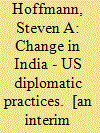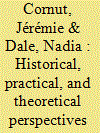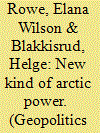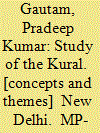|
|
|
Sort Order |
|
|
|
Items / Page
|
|
|
|
|
|
|
| Srl | Item |
| 1 |
ID:
099802


|
|
|
|
|
| Publication |
New Delhi, IDSA, 2010.
|
| Description |
40p.
|
| Series |
IDSA occasional paper no. 10
|
| Standard Number |
9788186019726
|
|
|
|
|
|
|
|
|
|
|
|
Copies: C:2/I:0,R:0,Q:0
Circulation
| Accession# | Call# | Current Location | Status | Policy | Location |
| 055389 | 327.254073/HOF 055389 | Main | On Shelf | General | |
| 055390 | 327.254073/HOF 055390 | Main | On Shelf | General | |
|
|
|
|
| 2 |
ID:
153919


|
|
|
|
|
| Summary/Abstract |
France took a hardline stance against Tehran’s nuclear program. Yet for several decades, the French government adopted a softer line with regard to nonproliferation. France was the last permanent member of the UN Security Council to ratify the 1968 Non-Proliferation Treaty (NPT). In the 1960s and 1970s, Paris sold nuclear facilities to Israel, Iran, and Iraq, some of which had potential military uses. Why did France change its policy on nonproliferation? By reconstructing the evolution of France’s position with respect to Iraq’s and Iran’s nuclear programs since the 1970s, this article explains how Paris shifted from reluctant loner to one of the main promoters of the norm of nonproliferation. The changing role of a second-tier power stems from transformations in the division of diplomatic labor inside and outside the state. Drawing on archival and interview data, we show how a group of French diplomats, followed by political leaders and nuclear scientists, mobilized the nonproliferation norm and carved out a role for France in the international system. Throughout this period, successive presidents faced fragmented domestic fields in which bureaucratic and political struggles shaped French policy. These struggles refracted the impact of the international system on France’s slow and uneven convergence with the US position.
|
|
|
|
|
|
|
|
|
|
|
|
|
|
|
|
| 3 |
ID:
170933


|
|
|
|
|
| Summary/Abstract |
This article analyses changes in diplomatic practices brought by twenty-first century communications technologies. There exists a close relationship between communications technologies and diplomatic practices. Since the invention of the telegraph at the end of the nineteenth century, diplomacy has been conducted at a progressively faster pace. The most recent technological developments associated with Internet have increased the speed and reach of communications, with consequences in international politics that International Relations scholars have yet to understand. Building on existing scholarship in diplomatic studies, the analysis adopts a historical perspective on the use of technology in diplomacy, examines the impact of digitalisation on diplomatic practices, and suggests new research questions that scholars need to answer. All this shows that International Relations scholars would be well-served by looking at the transformative impact of new communications technologies.
|
|
|
|
|
|
|
|
|
|
|
|
|
|
|
|
| 4 |
ID:
129596


|
|
|
|
|
| Publication |
2014.
|
| Summary/Abstract |
The aim of this article is to examine what the geopolitics of the Arctic look like as seen from the largest Arctic state. How are narratives about the development of the region received, reworked and produced in a Russian context? We find that Russian policy actors distance themselves from discourses of Arctic conflict and geopolitical competition, and examine how this approach may serve some of Russia's key interests in the region. We further argue that the key tension in the Arctic region is not along the conflict/cooperation axis, but rather lies in the tricky process of delineating between international cooperation and national sovereignty in tackling Arctic problems. In attempting to illustrate the various voices, ideas and interests that shape Russia's policy understanding of the Arctic and its challenges and opportunities, we draw upon a media analysis and a set of qualitative interviews with representatives of the five Arctic states.
|
|
|
|
|
|
|
|
|
|
|
|
|
|
|
|
| 5 |
ID:
178217


|
|
|
|
|
| Publication |
New Delhi, MP-IDSA, 2021.
|
| Description |
126p.pbk
|
| Series |
MP-IDSA Monograph Series no.;70
|
| Standard Number |
9789382169970
|
|
|
|
|
|
|
|
|
|
|
|
Copies: C:2/I:0,R:0,Q:0
Circulation
| Accession# | Call# | Current Location | Status | Policy | Location |
| 059997 | 894.8/GAU 059997 | Main | On Shelf | General | |
| 059998 | 894.8/GAU 059998 | Main | On Shelf | General | |
|
|
|
|
|
|
|
|
|